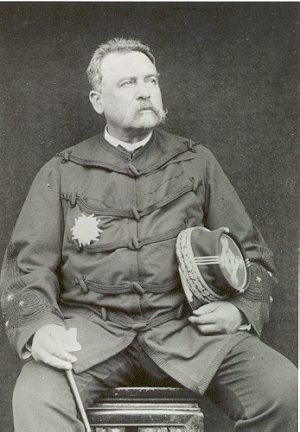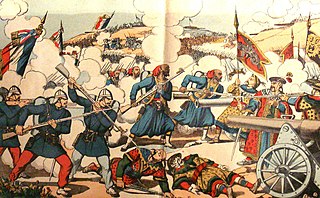
The Sino-French War, also known as the Tonkin War, was a limited conflict fought from August 1884 to April 1885 between the French Third Republic and Qing China for influence in Vietnam. There was no declaration of war.

The Battle of Bang Bo, known in China as the Battle of Zhennan Pass, was a major Chinese victory during the Sino-French War. The battle, fought on 23 and 24 March 1885 on the Tonkin-Guangxi border, saw the defeat of 1,500 soldiers of General François de Négrier's 2nd Brigade of the Tonkin Expeditionary Corps by a Chinese army under the command of the Guangxi military commissioner Pan Dingxin.

The siege of Tuyên Quang was an important confrontation between the French and the Chinese armies in Tonkin during the Sino-French War. A French garrison of 619 men, including two companies of the French Foreign Legion, successfully defended the French post of Tuyên Quang against vastly outnumbering Chinese forces in a four-month siege from 24 November 1884 to 3 March 1885. 'Tuyên Quang 1885' remains one of the Legion's proudest battle honours.

Louis Alexandre Esprit Gaston Brière de l'Isle was a French Army general who achieved distinction firstly as Governor of Senegal (1876–81), and then as general-in-chief of the Tonkin Expeditionary Corps during the Sino-French War.
The Battle of Phu Lam Tao was a politically significant engagement during the Sino-French War, in which a French Zouave battalion was defeated by a mixed force of Chinese soldiers and Black Flags.
The Battle of Hòa Mộc was the most fiercely fought action of the Sino-French War. At heavy cost, Colonel Giovanninelli's 1st Brigade of the Tonkin Expeditionary Corps defeated forces of the Black Flag and Yunnan Armies blocking the way to the besieged French post of Tuyên Quang.

The Tonkin Expeditionary Corps was a French military command based in northern Vietnam (Tonkin) from June 1883 to April 1886. The expeditionary corps fought the Tonkin Campaign (1883–86) taking part in campaigns against the Black Flag Army and the Chinese Yunnan and Guangxi Armies during the Sino-French War and the period of undeclared hostilities that preceded it, and in important operations against Vietnamese guerrilla bands during the subsequent 'Pacification of Tonkin'.

The Lạng Sơn campaign was a major French offensive in Tonkin during the Sino-French War. The Tonkin Expeditionary Corps, under the command of General Louis Brière de l'Isle, defeated the Chinese Guangxi Army and captured the strategically important town of Lạng Sơn in a ten-day campaign mounted under formidable logistical constraints.

The Bắc Lệ ambush was a clash during the Tonkin Campaign in June 1884 between Chinese troops of the Guangxi Army and a French column sent to occupy Lạng Sơn and other towns near the Chinese border. The French claimed that their troops had been ambushed by the Chinese. The incident led to the Sino-French War.

The Bắc Ninh campaign was one of a series of clashes between French and Chinese forces in northern Vietnam during the Tonkin campaign (1883–86). The campaign, fought during the period of undeclared hostilities that preceded the Sino-French War, resulted in the French capture of Bắc Ninh and the complete defeat of China's Guangxi Army.

The Kép campaign was an important campaign in northern Vietnam during the opening months of the Sino-French War. A force of just under 3,000 French troops under the command of General François de Négrier defeated a major Chinese invasion of the Red River Delta launched by Pan Dingxin's Guangxi Army in successive engagements at Lâm, Kép and Chũ.
The Tonkin Flotilla of 1883 was a flotilla of French Imperial gunboats and despatch vessels used to enforce French Colonial rule on the waterways of Tonkin. It was organized during an episode of the French Conquest of Vietnam known as the Tonkin campaign (1883–1886), in which the French were to fight against—variously—the Vietnamese, Liu Yongfu's Black Flag Army and the Chinese Guangxi and Yunnan armies with the objective of occupying Tonkin and entrenching a French protectorate there.

François Oscar de Négrier, known as Oscar de Négrier, was a French general of the Third Republic, winning fame in Algeria in the Sud-Oranais campaign (1881) and in Tonkin during the Sino-French War.

The Tonkin campaign was an armed conflict fought between June 1883 and April 1886 by the French against, variously, the Vietnamese, Liu Yongfu's Black Flag Army and the Chinese Guangxi and Yunnan armies to occupy Tonkin and entrench a French protectorate there. The campaign, complicated in August 1884 by the outbreak of the Sino-French War and in July 1885 by the Cần Vương nationalist uprising in Annam, which required the diversion of large numbers of French troops, was conducted by the Tonkin Expeditionary Corps, supported by the gunboats of the Tonkin Flotilla. The campaign officially ended in April 1886, when the expeditionary corps was reduced in size to a division of occupation, but Tonkin was not effectively pacified until 1896.
The Retreat from Lạng Sơn was a controversial French strategic withdrawal in Tonkin at the end of March 1885 during the Sino-French War. It represented the last major event of the conflict and was deemed a considerable embarrassment in France, further cementing negative public opinion about the colonial conflict which led to the collapse of French Prime Minister Jules Ferry's government.

The Battle of Núi Bop was a French victory during the Sino-French War. The battle was fought to clear Chinese forces away from the French forward base at Chu, and was an essential preliminary to the Lạng Sơn Campaign in February 1885.

The Capture of Hưng Hóa was an important French victory in the Tonkin Campaign (1883–86).

Charles-Théodore Millot was a French general who distinguished himself in the Franco-Prussian War (1870–71) and the Tonkin Campaign (1883–86). His victories at Bắc Ninh and Hưng Hóa brought to an end the two-year undeclared war in northern Vietnam between France and China, and paved the way for the conclusion of the Tientsin Accord between the two countries on 11 May 1884. Millot resigned as general-in-chief of the Tonkin Expeditionary Corps shortly after the outbreak of the Sino-French War on 23 August 1884 and returned to France.

The Tonkinese Rifles were a corps of Tonkinese light infantrymen raised in 1884 to support the operations of the Tonkin Expeditionary Corps. Led by French officers seconded from the marine infantry, Tonkinese riflemen fought in several engagements against the Chinese during the Sino-French War and took part in expeditions against Vietnamese insurgents during the subsequent French Pacification of Tonkin. The French also organized similar units of indigenous riflemen from Annam and Cambodia. All three categories of indigenous soldiers were known in Vietnam as Lính tập.

Paul-Gustave Herbinger was a French Lieutenant Colonel who was best known for his role in the Retreat from Lạng Sơn in the Sino-French War.



















